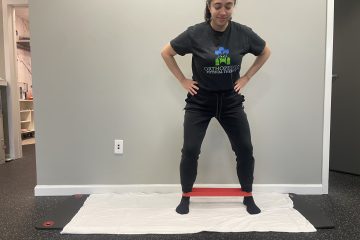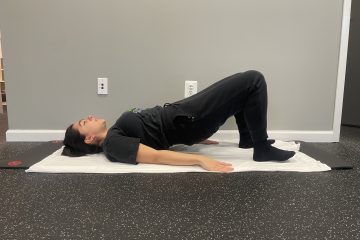When it comes to prenatal care, you typically have 10 to 15 doctors appointments before your baby is born. And then in the first year postpartum… just one. That mystical, supposedly all-encompassing 6-week check-up is where you typically get the “all clear” to return to exercise, activity, and intercourse. But is that enough? And what happens if you don’t feel okay to return to life as normal?
 Enter the pelvic floor physical therapists: The musculoskeletal experts when it comes to pregnancy, postpartum, and all things bladder, sexual, and bowel health. At that 6-week postpartum appointment, your OBGYN or midwife is great at determining if your uterus and stitches are healing appropriately, but pelvic floor physical therapists are the true specialized providers you want to seek out to know if and when you’re ready to return to all of your pre-baby activities like normal. And if your body is not ready or you’re experiencing issues postpartum (leakage, pain with intercourse, urgency, etc.), they can help you figure out how to fix them so you can safely get back to everything you want to do.
Enter the pelvic floor physical therapists: The musculoskeletal experts when it comes to pregnancy, postpartum, and all things bladder, sexual, and bowel health. At that 6-week postpartum appointment, your OBGYN or midwife is great at determining if your uterus and stitches are healing appropriately, but pelvic floor physical therapists are the true specialized providers you want to seek out to know if and when you’re ready to return to all of your pre-baby activities like normal. And if your body is not ready or you’re experiencing issues postpartum (leakage, pain with intercourse, urgency, etc.), they can help you figure out how to fix them so you can safely get back to everything you want to do.
What can a pelvic health PT help with in the postpartum period?
The answer: lots! Pelvic health physical therapists are the experts when it comes to the muscles, ligaments, bones, and nerves of the pelvis, low back, and hips. They also deal with any and everything bowel, bladder, and sex related. This includes treating and addressing issues like: pelvic pain, pain with intercourse, urinary urgency or frequency, pelvic organ prolapse, recurrent UTIs, stress incontinence, constipation, endometriosis, tailbone pain, and more.
The most common problems postpartum include incontinence and pelvic organ prolapse, with nearly one-third of postpartum individuals reporting one of these issues after a vaginal birth. Some people think that having a cesarean section (c-section), can alleviate these problems, but the research says otherwise. Nearly 90% of people with a c-section will experience pain with intercourse in the postpartum period and a large percentage may develop urinary urgency and/or frequency, in addition to incontinence. Pelvic health physical therapists are also trained to assess and treat abdominal separation, also known as diastasis recti abdominis (DRA), which nearly every single person will have by 36 weeks of pregnancy. The “mom pooch” which can be so difficult to get rid of postpartum, may be a sign that you have this, in which case a pelvic health PT is the best person to work with.
With statistics this high, it’s no surprise that so many people experience issues postpartum. But as a society, we have normalized a lot of these issues, as if peeing your pants or always having to go to the bathroom is a badge of honor after having a baby. Luckily, it doesn’t have to be, there are healthcare providers who can help, and the sooner you decide to address it, the quicker you’re going to feel like yourself again.
Who should see a pelvic health physical therapist postpartum?
In our professional opinion, everyone should see a pelvic health physical therapist for an evaluation and assessment in the immediate postpartum period. As previously mentioned, pelvic health PTs are the experts when it comes to determining your readiness to return to exercise and sexual intercourse post-baby. They can also help identify any residual problems from pregnancy or birth that may prevent you from doing what you love to do. It’s important to remember that there is nothing magical about what happens from 41 to 42 days postpartum. 6 weeks is the typical healing time for the uterus, but it tells us nothing about how well your muscles are functioning or whether they are ready for exercises like lifting weights, running, or jumping. In fact, the average healing time for muscles and ligaments is about 12 weeks, so the majority of people returning to exercise at 6 weeks may be at an increased risk of injury or pelvic floor issues. Conversely, pelvic health PTs can begin working with patients as soon as 3 weeks postpartum to aid in healing of the muscles and ligaments as well as to help prevent injury.
If you experience any of the following issues, you should opt to seek care from a pelvic health physical therapist:
- Urinary or fecal leakage
- Frequent or urgent urination
- Constipation lasting longer than 1-2 weeks
- Feeling of heaviness or soreness in pelvic region lasting longer than 1-2 weeks
- Low back, pelvic, hip, or tailbone pain
- Pain with intercourse, tampons, or pelvic exams
- Abdominal pain or bloating
- Abdominal separation or a “mom pooch”
Additionally, if you had a birth that involved an episiotomy, forceps, vacuum, pushing for an extended period of time (>60 minutes), tearing that required stitches, or a c-section, you should seek out care from a pelvic health physical therapist, as all of these can increase your chance of pelvic floor dysfunction.
I just had a baby! When should I see a pelvic floor PT?
Despite popular belief, you do not have to wait until your 6-week follow up with your OBGYN or midwife to see a pelvic floor physical therapist. In fact, most pelvic health PTs will recommend that you schedule an initial visit anywhere from 3-4 weeks postpartum. This allows us to get a headstart on breathing, lifting techniques, and making sure you’re doing the right things to encourage and promote healing. Luckily, this appointment can occur in-person or via telehealth, whatever you are most comfortable with.
During your initial visit postpartum, your pelvic health physical therapist will evaluate your posture and movement, assess for abdominal separation, look at your breathing and lifting mechanics, teach you how to engage your deep core muscles, and assess for healing of your pelvic floor and/or c-section scar. They will also review your bladder and bowel habits and determine if you’re at risk or currently experiencing any pelvic floor dysfunction. Until bleeding stops (usually by 6-8 weeks postpartum), an internal pelvic floor assessment will not be offered and can be deferred if you are not comfortable with this type of exam.
All 50 states plus Washington D.C. have direct access to physical therapists, meaning you do not need a referral to see one postpartum, although you may need a referral after a specific number of days or for a specific type of treatment. You can proactively ask for a referral at your last prenatal appointment or after your birth if you’d like to get a head start on the process, but it is not a requirement to be able to seek care.
When it comes to recovering after a baby, know that postpartum is forever. It is never too early (or too late) to get started on healing your body after a baby. If you are experiencing any problems postpartum whether that’s pain, leakage, or not feeling like yourself, a pelvic floor physical therapist can help!
Curious to learn a little bit more about how pelvic health physical therapy can help you during pregnancy and postpartum? Schedule your FREE 10-minute consult call today ✨
Be empowered in education,
OrthoPelvic Physical Therapy


